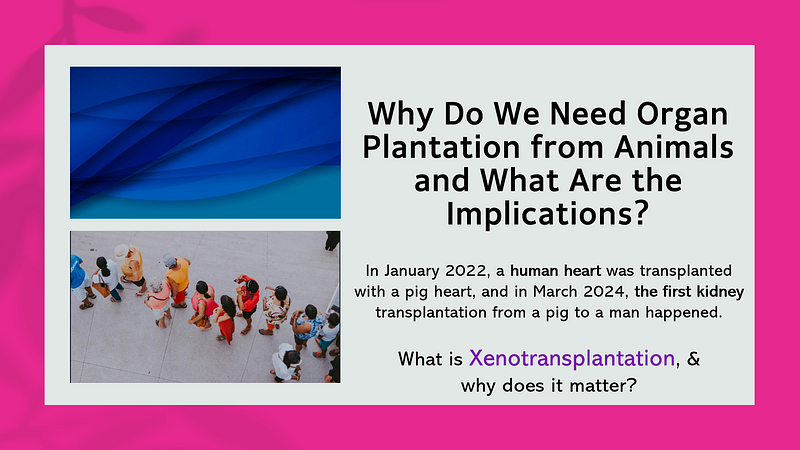Revolutionizing Organ Transplantation: A New Era with Pig Kidneys
Written on

For years, I have monitored advancements in health sciences and technology. Recently, I wrote about the "diffusion of innovation" theory, emphasizing its relevance in public health to motivate my audience. My primary focus was on how successful public health strategies can harness emerging technologies to improve health outcomes.
One topic of discussion was precision medicine through gene editing. While it might seem radical or intimidating to some, the concept is not implausible and holds the potential to save millions of lives as it becomes more widespread.
Notable scientists, including Nobel Laureates, have made significant strides in this field, particularly in the last two years, which I aim to highlight in this article.
Recent Advances in Xenotransplantation
In 2022, researchers published findings in the New England Journal of Medicine, addressing the severe shortage of transplantable organs and exploring genetically modified pig organs as a viable solution. They confronted the challenge of hyperacute rejection but engineered pigs with specific genetic modifications to help overcome this issue.
In a groundbreaking study, kidneys from these genetically altered pigs were transplanted into two brain-dead human recipients, who were maintained on ventilators throughout the trial. Remarkably, the transplanted kidneys began functioning immediately, producing urine, which instilled optimism among the medical team. Over the 54-hour duration of the study, the kidneys continued to perform well, with tests indicating improved health as creatinine levels decreased after the transplant.
Biopsies taken at regular intervals showed no signs of rejection, reinforcing the potential success of these transplanted organs. Throughout the experiment, the kidneys displayed exceptional functionality, with urine output exceeding expectations.
> By the end of the study, it was clear that the genetically modified pig kidneys had not only survived but thrived within the human bodies, offering renewed hope for viable organ transplantation alternatives.
The Physicians Committee reported that in January 2022, a 57-year-old man received a pig heart due to a life-threatening heart condition, although he passed away two months later, with the cause of death still uncertain. This instance highlighted the potential complications associated with xenotransplantation.
A year later, in October 2023, researchers published findings in Nature regarding pig kidneys modified to resemble human kidneys more closely. When these kidneys were transplanted into monkeys, they exhibited prolonged functionality, suggesting that these genetic adjustments could enhance their suitability for human transplantation. This research brings us closer to testing pig kidneys in human patients.
In March 2024, the first pig kidney transplant was successfully performed on a 62-year-old man named Slayman at Massachusetts General Hospital in Boston, as detailed in a scientific report published in Nature and BMJ. Slayman received a kidney from a miniature pig that had undergone 69 genetic modifications to prevent organ rejection and viral infections.
The fundamental innovation here is the genomic edits aimed at reducing the risk of rejection and inactivating viruses, thus enhancing safety for the recipient. Further refinement of these genetic modifications could eliminate the necessity for immunosuppressive medications, potentially transforming the landscape of organ transplantation.
This pioneering surgery could significantly alleviate the critical shortage of human organs, addressing the tragic reality of thousands of individuals dying each year while waiting for transplants. Initial results indicate that pig organs may be safe and function comparably to human organs in the short term, setting the stage for larger clinical trials.
Researchers have noted that all US transplants involving animal organs, including Slayman’s case, have been granted approval for compassionate use. They remain hopeful that the FDA will sanction extensive clinical trials to offer renewed hope to patients and their families.
Having provided this encouraging context, I would like to briefly explain the concept of xenotransplantation in biotechnology.
Understanding Xenotransplantation
Xenotransplantation refers to the transfer of cells, tissues, and organs between different species. "Xeno" signifies foreign, and in this context, it involves transplanting animal organs into humans.
The core idea is to harvest organs from animals, such as pigs, alter them genetically to enhance compatibility with human biology, and then transplant them into human recipients. Key enablers of this process include gene editing and genetic disenhancement, which minimize the risk of organ rejection and the transmission of diseases from animals to humans.
The genetic modification of organs aims to prevent rejection by the recipient's immune system while also reducing the likelihood of zoonotic diseases. Through targeted genetic changes, organs can be tailored to improve compatibility, thus decreasing the chances of post-transplant complications.
Xenotransplantation has been explored for decades as a potential remedy for the shortage of human organs. The earliest attempts date back to the 17th century, while more focused efforts on using animals like pigs, primates, and baboons emerged in the 20th century.
According to a review published in 2024, the first documented attempts at xenotransplantation occurred in the 1600s with xenotransfusion, followed by xenoskin transplants in the 1800s, leading up to more ambitious trials in kidney xenotransplantation.
Advancements in medical science and technology have propelled xenotransplantation closer to reality, particularly with genetic engineering breakthroughs such as CRISPR-Cas9, which earned a Nobel Prize in 2020. Scientists have made significant progress in modifying animal organs for enhanced compatibility with human physiology, and some successful experimental transplants have been conducted.
Xenotransplantation holds the potential to revolutionize organ transplantation by providing a virtually limitless supply of organs for patients in urgent need, thereby saving lives and reducing long wait times for transplants.
The Need for Animal Organs
The necessity for animal organs in transplantation arises primarily from the severe scarcity of human organs available for donation. Despite ongoing efforts to boost organ donation rates, the demand consistently outpaces the supply. Many patients succumb while awaiting a compatible human donor organ.
In the US, someone new is added to the transplant waiting list every ten minutes. According to the FDA, approximately ten individuals die daily while on this waiting list, desperately awaiting life-saving organ transplants.
For instance, in Australia, around 1,750 people are currently awaiting organ transplants, all of whom have met eligibility criteria. These individuals typically wait between six months to four years, with some enduring even longer delays. Additionally, about 13,000 more are on dialysis due to kidney failure and may require transplants in the future. One organ donor can potentially save up to seven lives.

Concerns arise regarding the use of deceased individuals for organ donation, as suitable donors are limited due to consent issues and the quality of available organs. Factors such as age, medical conditions, and the cause of death often disqualify organs from deceased donors for transplantation.
Utilizing organs from animals, particularly pigs, which share similar anatomical and physiological traits with humans, could potentially alleviate this shortage. However, this approach is not without its own set of challenges and ethical considerations.
Challenges and Concerns with Animal Organs
Although xenotransplantation presents a promising solution to the organ shortage crisis, it brings forth ethical, safety, and regulatory challenges. There are concerns about the risk of zoonotic diseases—pathogens that can transfer from animals to humans—and the potential for organ rejection despite genetic enhancements.
A review published in February 2024 highlights the promise of xenotransplantation in addressing the urgent need for human organs, but also emphasizes the significant ethical considerations that must be navigated. Key concerns include xenozoonosis, regulatory hurdles, and the ethical treatment of animals.
It is crucial for patients, their families, and the broader community to understand that a confirmed case of zoonotic disease transmission could have serious repercussions for all parties involved. Nevertheless, the benefits of xenotransplantation for numerous patients facing dire health conditions may outweigh these risks.
For instance, patients with type 1 diabetes could significantly benefit from islet cell xenotransplantation, offering life-changing and potentially life-saving treatment options amid the critical shortage of human donor organs.
Who Requires Organ Transplantation?
Organ transplantation is necessary for patients suffering from various medical conditions. Common diseases necessitating transplants include end-stage kidney failure, chronic liver disease, heart failure, chronic obstructive pulmonary disease (COPD), cystic fibrosis, type 1 diabetes, specific cancers, and autoimmune disorders affecting organs.
Each of these conditions can severely compromise the function of vital organs, leading to life-threatening complications and drastically diminishing the patient’s quality of life. Below is a brief overview of these conditions:
> End-stage renal disease leads to complete kidney failure, resulting in the dangerous accumulation of waste in the body.
> Chronic liver disease may progress to cirrhosis, where scar tissue replaces healthy tissue, impairing liver function.
> Congestive heart failure occurs when the heart cannot effectively pump blood, resulting in fluid buildup in the lungs and other areas.
> Chronic obstructive pulmonary disease progressively damages the lungs, causing breathing difficulties.
> Cystic fibrosis is a genetic disorder impacting the lungs and digestive system, leading to severe respiratory and digestive issues.
> Type 1 diabetes can result in severe complications affecting multiple organs, necessitating transplantation in critical cases.
> Certain cancers may require organ transplants if the disease has metastasized to vital organs like the liver or lungs.
> Autoimmune diseases can cause the immune system to attack healthy organs, leading to damage and dysfunction, potentially necessitating transplantation.
Organ transplantation can replace a failing organ with a healthy one from a donor, thus enhancing the patient's health and quality of life.
The Concept of Brain Transplantation
While I have explored various aspirations in this field since the 1990s, the idea of brain transplantation remains speculative and highly theoretical. The brain is a unique organ that controls the entire body and possibly houses the mind and consciousness.
Some experimental procedures have involved transplanting animal heads, particularly in rodents, but these experiments have faced significant ethical scrutiny and scientific skepticism.
The prospect of human brain transplantation encounters numerous obstacles, including reconnecting nerves and blood vessels, preventing immune rejection, and maintaining brain functionality. Ethical dilemmas, such as questions regarding identity and consciousness, also loom large.
Many scientists have deliberated on brain transplantation and related issues, with Dr. Sergio Canavero, an Italian neurosurgeon, being among the most vocal advocates, claiming that whole brain transplantation in humans may be technically feasible. He published an intriguing paper on this subject in Surgical Neurology International in 2022.
Conclusions and Insights
The recent successful pig kidney transplant in a 62-year-old man marks a significant milestone in xenotransplantation, offering renewed hope for individuals in dire need of life-saving organ transplants.
With continuous advancements in genetic engineering and medical technology, the potential for xenotransplantation to become a viable option for patients in need of critical organ transplants is promising. Furthermore, the transplantation of cells and tissues could also provide beneficial outcomes.
While xenotransplantation holds potential as a solution to the organ shortage crisis, it also presents ethical, safety, and regulatory challenges. There is a pressing need for thorough studies and significant refinements to address concerns surrounding zoonotic disease transmission and organ rejection.
As reported by CNN Health, over 100,000 individuals in the US are on the transplant waiting list, with an average of 17 dying each day while awaiting transplants. Medical professionals have explored various alternatives for decades, and many now see promise in utilizing genetically modified pig organs to replace failing human organs.
The Physicians Committee encourages individuals to register as organ and tissue donors, as donors can save lives and contribute to groundbreaking research aimed at reducing reliance on animal use. Those interested in registering in the US may do so through organdonor.gov.
Thank you for engaging with my insights. I wish you a healthy and fulfilling life.